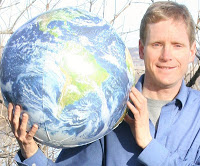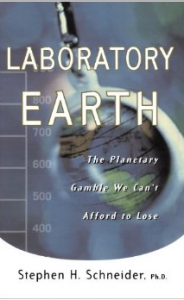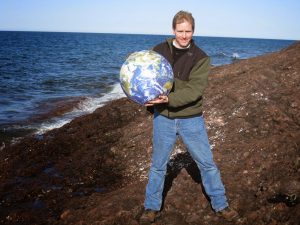Climate change can be a daunting and scary subject for a presentation to strangers. You may then wonder how on Earth you are going to keep an audience engaged and inspired on such a serious topic. I have been giving presentations on climate change for over a year now as a park ranger and public speaker. Let me share with you my 5 tips on how to do effective climate change presentations.
1. BE LIKABLE. Look for those ways to establish rapport with your audience. At my ranger talks, I always try to arrive about 30 minutes early to get to know the early arrivals in my audience. The top advice you always here for public presentations is KNOW YOUR AUDIENCE. However, do you do this? I chat with the audience members who arrive early by asking them where do they live, how did they hear about the program, what they did today, etc. By establishing connections with the early arrivals, they will become friendly faces in the crowd, providing even support and an open mind to your ideas.
2. BE ENTHUSIASTIC. Ralph Waldo Emerson was so correct when he stated, “Nothing great was ever achieved without enthusiasm.” If you are not excited about climate change, how will your audience be? Even more, if you are not about the solutions, especially the ideas of sustainability and hope, how can your audience get excited about this? Genuine enthusiasm is contagious. Dower is depressing. I know I just gave a great presentation when people come up to me and say, “I love how positive and enthusiastic you are.” I love baseball and I feel like I have hit a home run whenever I hear audience members say this to me.
3. BE CREDIBLE. Know your subject well. It is hard for them to question your knowledge if you have really done your homework. The greater amount of research you have put into your subject, the more confident you will speak about it also. If you have really researched your subject and feel strong confidence speaking about it, the greater that your audience will trust what you are saying and think of you as an authority.
4. BE FUNNY. Find some way to naturally incorporate humor into your program. As science fiction writer Isaac Asimov once remarked, “Jokes of the proper kind, properly told, can do more to enlighten questions of politics, philosophy, and literature than any number of dull arguments.” I cannot tell you how to be funny. To paraphrase E.B. White, ‘Analyzing humor is like dissecting a frog. Both die in the process.’ However, if you can find some natural humorous way to share funny stories, images, or analogies, then your audience will more likely stick with you on what they perceive is a heavy subject like climate change.
5. BE HOPEFUL. A friend of mine just returned from a presentation by Project Ocean. That speaker stressed the point that when people hear they have cancer, they do not research the molecular biology of cells. They want the solutions now on how they can fight cancer successfully. Is it exercise, diet, meditation, prayer, medication, surgery, sense of humor, or anything else Doctor? The huge planetary problems associated with climate change can be very scary for your audience to comprehend. What is your solutions for them?
John Lennon once said it best: “There are no problems. Only solutions.” You got to believe that.
In December 2010, Matthew Feinberg and Robb Willer at the University of California Berkeley published research paper, Apocalypse Soon?: Dire Messages Reduce Belief in Global Warming by Contradicting Just-World Beliefs. The researcher conducted two experiments on 97 UC Berkeley undergraduates to gauge their political attitudes and skepticism about global warming. The study concluded that “Fear-based appeals, especially when not coupled with a clear solution, can backfire and undermine the intended effects of messages.” In other words: GOT HOPE?
I would like to conclude with a statement I recently heard from Science Comedian Brian Malow. In his recent presentation at the American Geophysical Union Conference in San Francisco on ‘Delivering Your Message: Lessons from Stand-up Comedy, he remarked, “I admire scientists because they have maintained their child-like wonder of the world. The only other profession I can think of similar to this is clowns. And I think scientists are a lot less scary than clowns.”
I think it is so important to maintain those childlike qualities of wonder, fun, and hope as we engage people people with presentations on serious issues like climate change.



